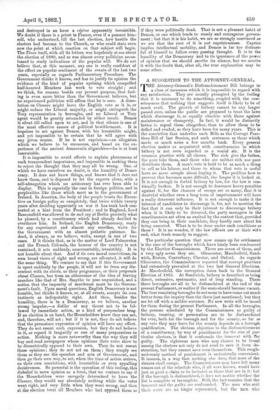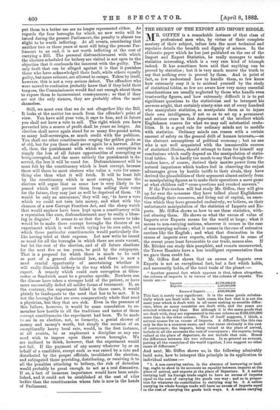A SUGGESTION TO THE ATTORNEY-GENERAL.
THE Attorney-General's Disfranchisement Bill belongs to a class of measures whioh it is impossible to regard with any satisfaction. They are usually prompted by the feeling that it is necessary to do something, coupled with the con- sciousness that nothing that suggests itself is likely to be of much avail. The growth of bribery cannot be any longer passed over, unless the public are prepared to treat the laws which discourage it, as equally obsolete with those against maintenance or champerty. In fact, it would be distinctly better to repeal them altogether, than to allow them to be defied and evaded, as they have been for many years. This is the conviction that underlies such Bills as the Corrupt Prac- tices Bill of last Session, and such sentences as those which made so much noise a few months back. Every general election makes us acquainted with constituencies in which bribery is not even regarded as a venial sin. It is the common practice with all classes. The rich give the bribes, the poor take them, and those who are neither rich nor poor distribute them. A man's vote is held to be as much a thing to sell as his labour, and those to whom that vote is useful have no more scruple about buying it. The problem how to prevent this becomes more difficult, the longer it is looked at. It is not enough to forbid bribery by law, for the law is con- tinually broken. It is not enough to denounce heavy penalties against it, for the chances of escape are so many, that it is doubtful whether even a long term of imprisonment will have a really deterrent influence. It is not enough to make it the interest of candidates to discourage it, for, not to mention the fact that it can only be their interest to discourage bribery when it is likely to be detected, the party managers in the constituencies are often so excited by the contest that, provided they can bring in their candidate, they hardly care about his being unseated. What is to be done under such conditions as these ? It is no wonder, if the law officers are at their wit's end, what fresh remedy to suggest.
The particular question that now comes up for settlement is the case of the boroughs which have lately been condemned by the Election Commissioners. There are seven of them, and a very ugly seven they are. Gloucester, Macclesfield, Sand- wich, Boston, Canterbury, Chester, and Oxford. As regards Gloucester, the Commissioners reported that corrupt practices had extensively prevailed at the two last General Elections. At Macclesfield, the corruption dates back to the General Election of 1865. At Sandwich, bribery is described as being direct, extensive, systematic, and of long standing. These three boroughs are all to be disfranchised at the end of the present Parliament, or earlier if the seats should become vacant. The four remaining boroughs do not seem to have come out much better from the inquiry than the three just mentioned; but they are let off with a milder sentence. No new writs will be issued for them during the present Parliament. In all the boroughs, the persons scheduled by the Commissioners as guilty of bribery, treating, or personation are to be disfranchised for ever, both for the borough and for the county, so far as any vote they may have for the county depends on a borough qualification. The obvious objection to the disfranchisement of a constituency, by way of punishment for the sins of par- ticular electors, is that it confounds the innocent with the guilty. The righteous men who may chance to be found among the electors not only do not avail to save it from de- struction, but they cannot save even themselves. This rough- and-ready method of punishment is undoubtedly convenient. It insures, in a way that nothing else does, that none of the sinners shall escape. The Commissioners may have left many names out of the schedule who, if all were known, would have just as good a claim to be included as those that are in it: but if the borough is disfranchised, it does not matter whether the list is complete or incomplete. Still, the fact remains that the innocent and the guilty are confounded. The men who sold their votes are no longer represented, but the men who
put them to a better use are no longer represented either. As regards the four boroughs for which no new writs will be issued during the present Parliament, the penalty is almost too Blight to be worth inflicting. At all events, considering that another two or three years at most will bring the present Par- liament to an end, it is not worth inflicting at the cost of carrying a Bill. The personal disfranchisement with which the electors scheduled for bribery are visited is not open to the objection that it confounds the innocent with the guilty. The only fault that can be alleged against it is that it punishes those who have acknowledged their fault, while others equally guilty, but more reticent, are allowed to escape. Taken by itself, however, this is not a very serious defect. The offenders who were moved to confession probably knew that if they held their tongues, the Commissioners would find out enough about them to expose them to inconvenient consequences ; so that if they are not the only sinners, they are probably often the most shameless.
Still, we must own that we do not altogether like the Bill. It looks at the matter too much from the offender's point of view. You have sold your vote, it says to him, and in future you shall not have a vote to sell. The right which you have perverted into a source of profit shall be yours no longer. An election shall never again stand for so many five-pound notes, so many half-sovereigns, so much credit with the publican. You shall see other constituencies reaping the golden grain as of old, but for you there shall never again be a harvest. After all, then, the punishment with which we visit corruption is simply the loss of all future opportunities of corrupting or being corrupted, and the more entirely the punishment is de- served, the less it will be cared for. Disfranchisement will be most felt by the constituency which is least corrupt, because there will there be most electors who value a vote for some- thing else than what it will fetch. It will be least felt by the constituency which is most corrupt, because the electors will argue that as some law is very likely to be passed which will prevent them from selling their votes for the future, they may just as well be deprived of them. 'It would be only an annoyance,' they will say, 'to have a vote which we could not turn into money, and what with the chances of a new Corrupt Practices Act, and the sharp watch that would anyhow have been kept upon a constituency with a reputation like ours, disfranchisement may be really a bless- ing in disguise.' It seems to us that the best course to take would be to make these corrupt boroughs the theatre of an experiment which is well worth trying for its own sake, and which these particular constituencies would particularly dis- like having tried at their expense. Let new writs be issued as usual for all the boroughs in which there are seats vacant, but let the cost of the election, and of all future elections for the next five or ten years, be paid by the ratepayers. That is a proposal for which there is much to be said as part of a general electoral law, and there is now a most crucial opportunity of ascertaining whether it will really diminish bribery in the way which its advocates expect. A remedy which could cure corruption at Glou- cester or Sandwich must be a genuine specific. Nowhere can the disease have taken a stronger hold of the patient, or have more successfully defied all milder forms of treatment. If, on the contrary, the experiment failed in these cases, it would plainly be inadequate to the need that has to be met. It is not the boroughs that are even comparatively whole that need a physician, but they that are sick. Even in the presence of this failure, however, it would be some consolation to re- member how hostile to all the traditions and tastes of these corrupt constituencies the experiment had been. To be made to see in an election, not, as formerly, a genial shower of money and money's worth, but simply the occasion of an exceptionally heavy local rate, would, in the first instance, at all events, be as unpleasant a discipline as any one need wish to impose upon these seven boroughs. We are inclined to think, however, that the experiment would not fail. If the payment of any money whatever by or on behalf of a candidate, except such as was raised by a rate and distributed by the proper officials, invalidated the election, and subjugated those providing, distributing, or receiving it to all the penalties attaching to bribery, the risk of detection would probably be great enough to act as a real dissuasive. If so, a fact of immense importance would have been estab- lished, and it could not be established at the cost of viler bodies than the constituencies whose fate is now in the hands of Parliament.



































 Previous page
Previous page